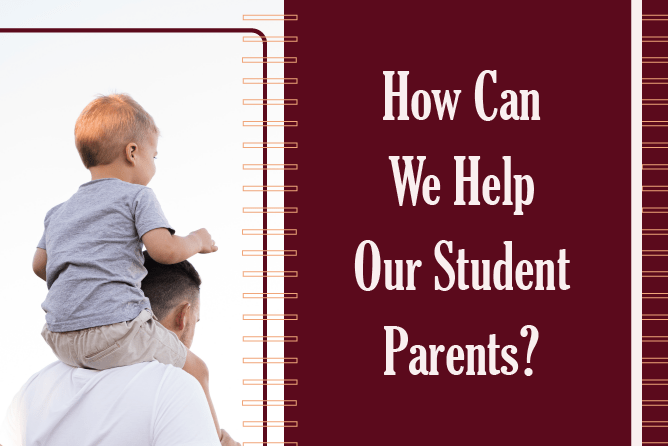This post was co-authored by Dr. Katia Levintova, a 2021-22 EDI Consultant, and Shannon Ribich, a 2021-22 EDI Intern.
How much do any of us know about the number of student parents in our classes or on our campus in general? What educational resources and solutions do our student parents want that we can, or already do, offer?
According to a campus survey and the childcare support program at the Dean of Students office, UWGB numbers are consistent with national statistics—about 16–20% of our students are also parents. They encompass all genders, they are veterans and consummate professionals, they are first generation students and returning students, and they represent various ethnic and racial groups. In many ways, they are just like the rest of our student body, but in many ways they are not. For one, student parents not only work 30+ hours a week on average, but also devote 10 hours a day to childcare responsibilities, leaving them with only 9 hours a day for sleeping, taking classes, studying, and any leisure activities. These precious 9 hours also often come in small increments, not in one block of time that coincides with typical class offerings.
Our student parents are also routinely disadvantaged when it comes to classroom policies, especially involving attendance and group work. They lack access to many high-impact practices or HIPs (especially study abroad opportunities, teaching assistantships, and leadership of student orgs), campus resources, and on-campus events. They do not have a sense of belonging on campus, but they value support, encouragement, and recognition of their dedication and persistence. And support has been coming, albeit not very fast.
The Taskforce on Student Caregiving, a new subcommittee of the UW System Caregiving Taskforce, recommends centralization of information about on campus resources and allies for student parents, priority course registration, better data collection reflecting the student parent population on campus, childcare subsidies, and universal childcare acknowledgements/statements in the syllabi. Nationally recognized best practices also include student parent-led and -focused campus orgs (to build community and network), specialized advising (ex: student orientation designed for student parents), cohorts, inclusion of student parents in marketing and campus materials, and access to changing tables and lactation rooms.
Some of these recommendations have already been implemented on our campus. Take, for example, our Dean of Students’ childcare support program, funded both by the federal grant and by UWGB SGA childcare student fees. We do have a lactation room and meeting rooms specifically for student parents, but more needs to be done. To this end, participants in the “Student Parent Advocacy Workshop” (held on campus on March 24, 2022) brought up several solutions that we can implement with relative ease and without major financial implications.
- Priority registration was one universal theme and, in this regard, the work on our campus has begun. Participants also stressed the need for more evening classes options for in-person courses, like labs and practicums, though increased evening, online, and hybrid offerings for student parents should extend beyond the sciences and medical fields.
- Another proposed initiative would aggregate all available student parents-related resources on campus—including the priority registration process—on one page, to be linked from the Dean of Students childcare support program page.
- In our classrooms, CATL can help by adding to already existing syllabus checklists two additional items: (1) a child care syllabus statement and (2) sample attendance policies ensuring that all pregnancy and caregiving-related absences will be automatically excused.
- Student parents are often distracted by the needs of their children and have shorter uninterrupted periods of time to devote to their studies. While preparing course materials, instructors might consider using shorter videos or reading materials (or breaking up longer materials into smaller chunks) which makes it easier to digest and retain the information.
- For access to HIPs, there is funding available in the Dean of Students’ childcare support program specific for participation in HIPs. However, we also need to promote these learning experiences to student parents and be more intentional about inviting them to participate in undergraduate research, teaching assistantships, and internships—the three HIPs that seem to be more accessible to student parents. For study broad access (a persistent problem), shorter trips or a destination with childcare facilities on campus might offer partial solutions as well.
So, what is next? Please expect continued work by student parent advocates and allies on our campus. You will recognize them by the “Student Parent Advocate” badges that were awarded for participating in this year’s programs highlighting student caregiving.
If all of us are more aware of the increasing presence of student parents on our campus and in our classrooms, are sensitive to their unique needs, and make these sensible changes in our teaching and student support roles, we will create a more inclusive community where student parents, too, feel a sense of belonging. They are, after all, truly modeling the essence of transformative education for the next generation of learners and, potentially, our future students!


